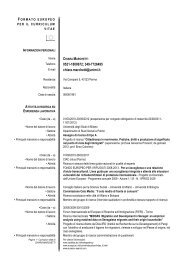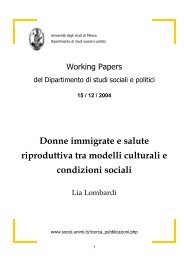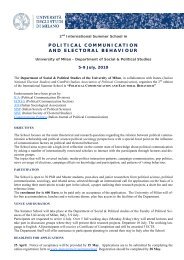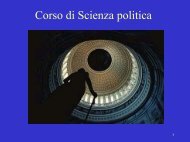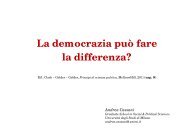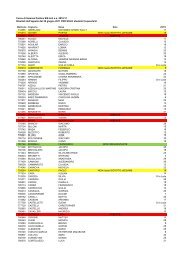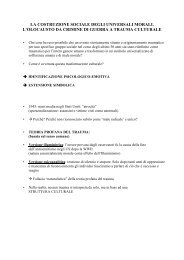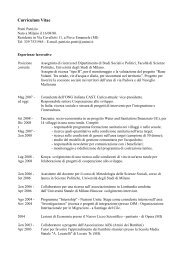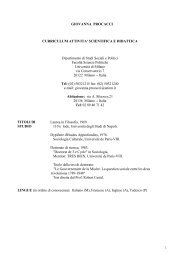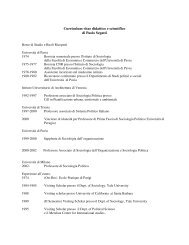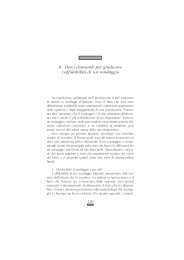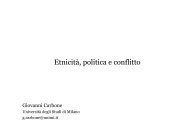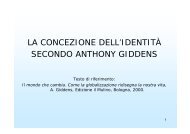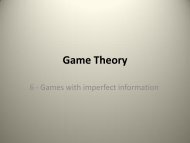The european dimension of political discourse in Italy. A ... - CIRCaP
The european dimension of political discourse in Italy. A ... - CIRCaP
The european dimension of political discourse in Italy. A ... - CIRCaP
Create successful ePaper yourself
Turn your PDF publications into a flip-book with our unique Google optimized e-Paper software.
THE EUROPEAN DIMENSION OF POLITICAL DISCOURSE IN ITALY.<br />
disappearance <strong>of</strong> the “no stances” attitude and a significant presence <strong>of</strong> both the two<br />
categories <strong>of</strong> Euroscepticism.<br />
FIGURE 6 ABOUT HERE<br />
“No surprise”, one could say: the party system transformation <strong>in</strong> the 1990s deeply affected<br />
party attitudes to EU. <strong>The</strong> forty-year process <strong>of</strong> preference shap<strong>in</strong>g on European <strong>in</strong>tegration<br />
that we described above has been replaced dur<strong>in</strong>g the 1990s by a totally new process. From<br />
the table summariz<strong>in</strong>g the documents <strong>of</strong> the n<strong>in</strong>eties (table 6) we can argue that most parties<br />
have been shap<strong>in</strong>g and re-shap<strong>in</strong>g their preferences dur<strong>in</strong>g the decade. <strong>The</strong> peculiar<br />
features <strong>of</strong> this process can be roughly summarized as follows:<br />
1) A significant discont<strong>in</strong>uity has been produced at the <strong>in</strong>dividual party level, s<strong>in</strong>ce<br />
changes can be found both <strong>in</strong> s<strong>in</strong>gle preferences towards specific issues (EU enlargement,<br />
Foreign and Security policy, Institutional enforcement, Role <strong>of</strong> the Commission), as well as <strong>in</strong><br />
the overall party attitudes towards European <strong>in</strong>tegration. In other words, it seems that the<br />
European issues became more sophisticated <strong>in</strong> this time, depend<strong>in</strong>g upon a grow<strong>in</strong>g number<br />
<strong>of</strong> normative <strong>dimension</strong>s. This led to more articulate party <strong>discourse</strong> and forced, even if with<br />
some relevant exceptions 19 , party elites to take more explicit positions, avoid<strong>in</strong>g the<br />
traditional “good will<strong>in</strong>g” or the “don’t compla<strong>in</strong>/don’t expla<strong>in</strong>” mode.<br />
2) As a consequence <strong>of</strong> it, we can see the signs <strong>of</strong> a slow passage from vagueness to<br />
clarity: <strong>in</strong> some cases preferences at the <strong>in</strong>dividual level are not yet clearly def<strong>in</strong>ed at the<br />
beg<strong>in</strong>n<strong>in</strong>g <strong>of</strong> this cycle, but they are gradually shaped over time. <strong>The</strong> most evident case <strong>in</strong><br />
this respect is perhaps Forza Italia. <strong>The</strong> newly born party was presented to the voters<br />
(obta<strong>in</strong><strong>in</strong>g an enormous consensus) on March 1994 with a manifesto quite scarce <strong>in</strong><br />
references to European Integration. After just a couple <strong>of</strong> months Forza Italia had to draft a<br />
European manifesto, which sounded quite vague, silent on the International role <strong>of</strong> EU and<br />
with a “neutral” position on the estimate <strong>of</strong> the domestic impact <strong>of</strong> the EU. This party has<br />
moved <strong>in</strong> recent times <strong>in</strong>to more Eurosceptical positions.<br />
3) Eurosceptical stances take a considerable importance over this decade. At some<br />
po<strong>in</strong>ts <strong>in</strong> time, the number <strong>of</strong> parties present<strong>in</strong>g Eurosceptical viewpo<strong>in</strong>ts and their overall<br />
vote rate is higher than usually acknowledged by the literature 20 .<br />
19 Forza Italia, <strong>in</strong> particular, <strong>of</strong>fers from time to time few hazy stances on the question <strong>of</strong> the future <strong>of</strong><br />
<strong>in</strong>tegration, provid<strong>in</strong>g an evident example <strong>of</strong> vagueness.<br />
20 See for <strong>in</strong>stance the recent contribution on Euroscepticism by Szczerbiak and Taggart (2002).<br />
Furhtermore, some pieces <strong>of</strong> literature devoted to the Italian <strong>political</strong> change have ignored the<br />
Eurosceptical views <strong>of</strong> the Italian centre-right parties (but also <strong>of</strong> the new communist party). For<br />
<strong>in</strong>stance, Gundle and Parker (1996), Bull and Rodhes (1997).<br />
29



